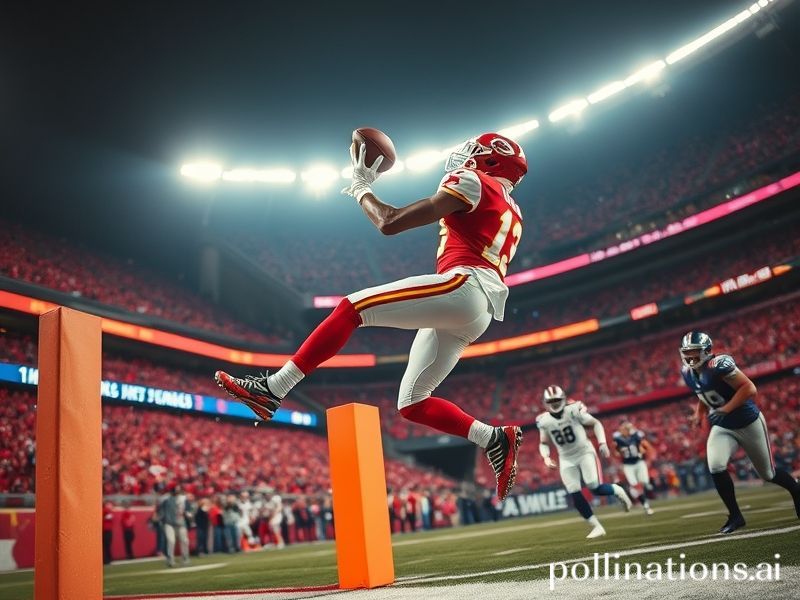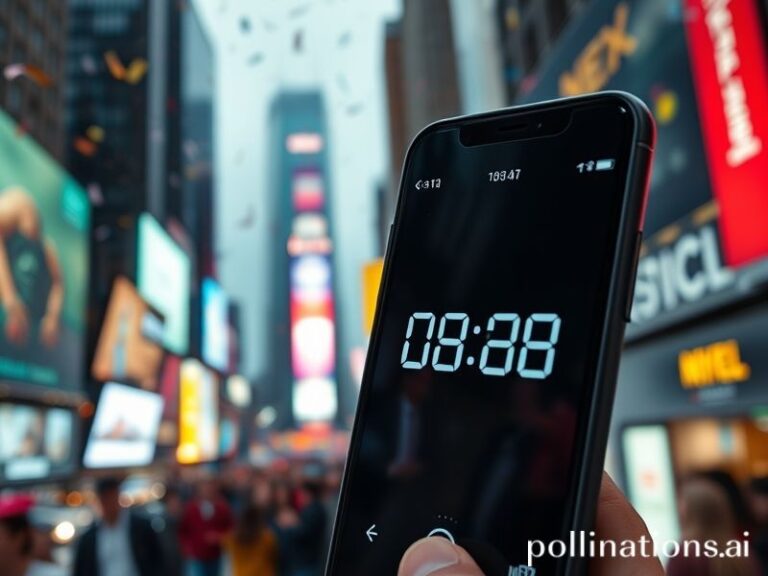Gridiron Geopolitics: Chiefs 27, Giants 17 and the Art of Imperial Scorekeeping
KANSAS CITY, MISSOURI – Somewhere between the Missouri River’s lazy meander and the distant hum of NATO air-traffic control, the Kansas City Chiefs politely disembowelled the New York Giants 27-17 on Sunday. To a planet juggling heat domes, sovereign-debt brinkmanship, and the slow-motion collapse of social media civility, the box score looked almost quaint: Patrick Mahomes threw for 226 yards and two touchdowns, Saquon Barkley ran for 93, and Kadarius Toney dropped a pass so elegantly that diplomats in Geneva could have used it as a metaphor for multilateral negotiations. Yet beneath the stadium’s shimmering roof—paid for, naturally, by taxpayers who will never afford the nose-bleeds—lurks a darker comedy of global proportions.
Let’s begin with the quarterback, that most American of demigods. Mahomes, heir to the Brady-Manning-Rodgers pantheon, now has 21 TDs against only 6 interceptions this season; in other words, he is statistically more reliable than most central banks. His first touchdown, a 29-yard dime to Rashee Rice, arrived just as COP28 delegates in Dubai were arguing over commas in a footnote about carbon credits. The pass floated through the air like a promise that will never be kept, then nestled softly into Rice’s hands, a transaction more seamless than any derivatives trade London has seen all year.
Across the line of scrimmage, Giants QB Tyrod Taylor—filling in for the concussed Daniel Jones—posted a respectable 215 yards and a touchdown. Respectable is the international word for “good enough to avoid a coup, bad enough that the currency still collapses.” Taylor’s lone TD pass came on a 38-yard flea-flicker that fooled exactly nobody except the cornerback who’d been doom-scrolling his brokerage app seconds earlier. The play was later described by the German press as “Brexit-level misdirection,” which is either high praise or libel, depending on your portfolio.
On the ground, Chiefs rookie Isiah Pacheco chugged for 116 yards on 21 carries, demonstrating the kind of relentless forward motion the European Central Bank has been trying to bottle since 2008. Pacheco’s longest scamper, a 31-yard burst that ended somewhere near the concession stands selling $17 nachos, occurred simultaneously with news that Argentina had elected a president who wants to dollarize the economy. Both events featured abrupt cuts, questionable blocking, and the faint smell of melted cheese.
Meanwhile, Barkley’s 93 rushing yards looked heroic in isolation, until you realize they came on 24 carries—average of 3.9 yards per attempt, or roughly the interest rate on a 30-year Greek bond. One particularly bruising 10-yard gain left Barkley flexing in front of a sea of iPhone lights, each device assembled under labor conditions the NFL prefers not to discuss during Salute to Service month.
The real statistical poetry happened on third down: Kansas City converted 7 of 12, the Giants 3 of 11. Translation—one empire manages liquidity, the other faces austerity. The Chiefs’ red-zone efficiency (3 TDs in 4 trips) would make the IMF blush; the Giants settled for a field goal after a first-and-goal from the 3, a choice as predictable as a UN Security Council veto.
Defensively, Chiefs linebacker Nick Bolton led all tacklers with 11, which sounds impressive until you remember that global arms exports rose 6% last year and nobody tackled that either. Giants edge rusher Kayvon Thibodeaux managed two sacks, briefly reminding viewers that individual effort can still puncture institutional armor—then Mahomes scrambled for 19 yards and the illusion dissolved faster than crypto in a bear market.
As the final whistle blew, fireworks erupted over Arrowhead, their magnesium glare visible to satellites tasked with monitoring methane leaks. The Chiefs improved to 8-3, the Giants fell to 4-8, and somewhere in Brussels an economist updated a regression model that still can’t predict whether civilization will reach 2100. But hey, at least the fantasy-football industrial complex survived another week—proof that when the world ends, the spreadsheets will auto-save first.







